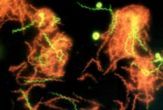Harvard Pledges $1 Million Annually to Study Life's Origin

Harvard University is beginning a research project to study how life began.
The team of researchers will receive $1 million in funding annually from Harvard over the next few years. The project begins with an admission that some mysteries about life's origins cannot be explained.
Most scientists believe that life on Earth originated in a soup of chemicals, but nobody knows how the chemistry moved from organic to biological. Theorists also suggest that life here could have arrived embedded in a space rock kicked up from Mars billions of years ago.
Still another idea is that microscopic life is common in the universe and could have reached Earth from another location.
"My expectation is that we will be able to reduce this to a very simple series of logical events that could have taken place with no divine intervention,'' said David R. Liu, a professor of chemistry and chemical biology at Harvard.
The "Origins of Life in the Universe Initiative'' is still in its early stages, scientists told the Boston Sunday Globe. Harvard has told the research team to make plans for adding faculty members and a collection of multimillion-dollar facilities.
Evolution is a fundamental scientific theory that species evolved over millions of years. It has been standard in most public school science texts for decades but recently re-emerged in the spotlight as communities and some states debated whether school children should also be taught about creationism or intelligent design.
Sign up for the Live Science daily newsletter now
Get the world’s most fascinating discoveries delivered straight to your inbox.
Intelligent design holds that life on Earth is too complex to have developed through evolution, implying that a higher power must have had a hand in creation. Backers of intelligent design argue that because scientists don't have all the answers, there must be a designer we can't grasp.
Scientists say that intelligent design, unlike evolution, makes no scientific predictions and is not testable, and so it is not a scientific theory. Scientists freely admit they don't know everything, but they cite the history of figuring things out as evidence that mysteries do not imply divine, undecipherable solutions.
Harvard has not been seen as a leader in origins of life research, but the university's vast resources could change that perception.
"It is quite gratifying to see Harvard is going for a solution to a problem that will be remembered 100 years from now,'' said Steven Benner, a University of Florida scientist who is one of the world's top chemists in origins-of-life research.
The Associated Press and LiveScience Staff contributed to this report.











